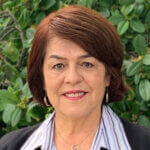Statement of Purpose: Ten Strands is introducing its staff through statements of purpose from each member that reveals the motivations and ambitions of their work. Today, we hear from Ten Strands Director of Equity and Inclusion Celeste Royer who shares how her own family traditions bring her hope in establishing a rich culture of environmental education for the next generation.
Growing up in a big Mexican-American family, I was fortunate to celebrate many occasions steeped in cultural traditions and customs. We hit a piñata at birthday parties, danced folklorico and salsa, and made tamales to eat during the holidays. These cultural traditions feed my spirit, ground me, and motivate me with a sense of purpose. I am ever grateful to my parents, grandparents, and other relatives for taking the time to share their stories, cook meals, celebrate our heritage, and pass on the traditions of past generations. It has been a fulfilling experience to carry on these family traditions and pass them on to my own children.
Imagine if environmental and outdoor education was a collection of traditions that every person celebrated and engaged in every year or even every day of their lives! Imagine all toddlers and preschoolers playing and learning in outdoor settings and establishing a connection with the natural world. Imagine all elementary school students participating in lessons in outdoor classrooms and taking field trips to natural areas. Imagine all secondary students conducting investigations in fields, creeks, and shorelines, collecting data to analyze, and making decisions about how to preserve and conserve our natural resources. Imagine our education system supporting the tradition of every student in every grade at every school, having opportunities to learn about the environment, study real-world issues, and connect with nature. Fostering students’ relationship with nature today contributes to them forming lifelong traditions that they will want to pass on to future generations.
As a member of the Ten Strands team, I am committed to working with all of our partners from the K-12 education system, community-based partners, government agencies, businesses, and the greater community towards establishing environmentally-minded traditions. These traditions will provide equitable access to opportunities for students to learn about our planet — in classrooms, in outdoor spaces on school campuses, in urban, suburban, or rural neighborhoods, and all types of natural environments. This sounds like a monumental task, and frankly, it is. I embrace the challenge and view it as a part of my purpose in working at Ten Strands.

Establishing the traditions that I alluded to earlier within the education system will require widespread support and resources. Curriculum resources to teach the Environmental Principles and Concepts must include lessons that teach science about ecosystem function and climate change. Teachers need access to professional learning opportunities to enhance their knowledge, build new skills, and enable them to effectively teach these lessons. School facilities and grounds need improvements to become healthy environments for students to learn and play. Students need access to outdoor learning spaces such as gardens, fields, parks, creeks, forests (urban and wild), and coasts. Community-based partners can provide support to the school districts and need to be included in the development of educational resources and the delivery of program services.
I often ask myself and my colleagues where we should place priority or emphasis in our work so that we address the many inequities in our society. Which school communities warrant the greatest amount of support and funding? Which resources would help teachers, students, and families the most? In my role as the Director of Equity and Inclusion, I look through the lens of equity, inclusion, justice, and cultural relevance to try to answer these questions.
Then I realize that the answers to such broad and complex questions must include the voices of many others. To build the tradition of every student in every grade at every school engaging in activities that advance their environmental literacy, we must ask local community members to identify their needs and the ways to best meet those needs. I hope to help provide the opportunities and the spaces to have these conversations.
The process of writing my statement of purpose for the work I do at Ten Strands has been introspective. It encouraged me to stop and think about what I’m working toward, whom the work includes, and the most equitable and inclusive ways to go about it. As a career environmental and outdoor educator, my hope is that all children have the chance to be outdoors often, fall in love with nature, and build a relationship with the Earth that inspires them to have traditions for caring for the planet. I will work toward changing the education system to include these opportunities as a way of passing on my own traditions to the next generation.


One Response
Beautiful, Celeste! Thanks for this. Your purpose and thoughtfulness is why we all want so much to work with you!